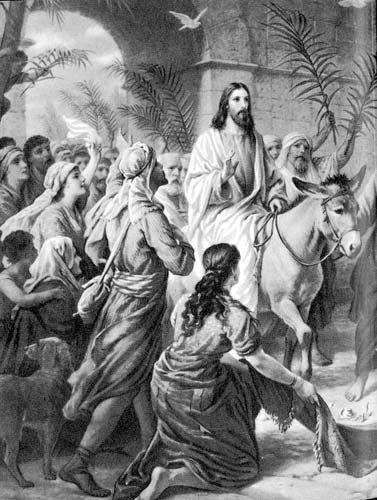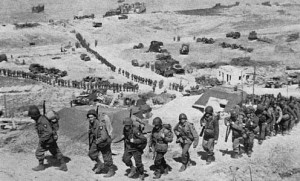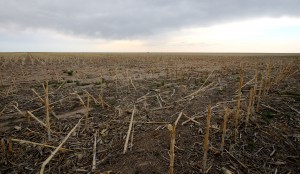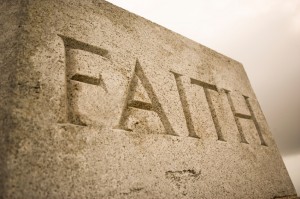====================
A homily offered by the Rev. Dr. C. Eric Funston on the First Sunday of Advent, November 27, 2016, to the people of St. Paul’s Episcopal Church, Medina, Ohio, where Fr. Funston is rector.
(The lessons for the day are from the Revised Common Lectionary for Advent 1 in Year A: Isaiah 2:1-5; Psalm 122; Romans 13:11-14; and St. Matthew 24:36-44. These lessons can be read at The Lectionary Page.)
====================
 “Two will be in the field; one will be taken and one will be left. Two women will be grinding meal together; one will be taken and one will be left. Keep awake therefore, for you do not know on what day your Lord is coming.” (Matt 24:40-42) You probably have friends who have told you these verses from Matthew’s Gospel describe something called “the Rapture.” You may have read the Left Behind books or seen the movies. So you may think you have a handle on what these verses mean and why they are offered to us as we begin our Advent preparation to celebrate the anniversary of Christ’s Incarnation and to look forward to his return, his “Second Coming.”
“Two will be in the field; one will be taken and one will be left. Two women will be grinding meal together; one will be taken and one will be left. Keep awake therefore, for you do not know on what day your Lord is coming.” (Matt 24:40-42) You probably have friends who have told you these verses from Matthew’s Gospel describe something called “the Rapture.” You may have read the Left Behind books or seen the movies. So you may think you have a handle on what these verses mean and why they are offered to us as we begin our Advent preparation to celebrate the anniversary of Christ’s Incarnation and to look forward to his return, his “Second Coming.”
Well… just hold that thought for a moment and let’s explore the first reading before we get back to it.
This is such a great passage from the Prophet Isaiah that we have this morning. It’s got those wonderful verses that are carved into the wall of the broad plaza across the street from the United Nations building in New York City:
They shall beat their swords into ploughshares,
and their spears into pruning-hooks;
nation shall not lift up sword against nation,
neither shall they learn war any more. (Isa 2:4, NRSV)
It’s got all that wonderful imagery of the nations of the world streaming toward the Temple of the Lord in Jerusalem, at peace with one another. It’s a wonderful, wonderful vision.
We keep waiting for it, don’t we?
Isaiah saw this vision during the reign of King Uzziah of Judah about 750 years before Jesus’ time. Isaiah promulgated what is known as “Zion theology,” a religious understanding of Jerusalem as the center of the world and the Temple as the center of Jerusalem. The Lord will come to it and its mount, Holy Zion, will be the most prominent mountain. The nations will all come to Jerusalem to learn divine teaching. Yahweh, enthroned in the Temple, will mediate and end all international conflict. The waging of war will cease.
Of course, none of that has ever happened, but for nearly eight centuries after Isaiah the son of Amoz this was the belief and hope of Israel, of all Jews. The realities of this text exist in the realms of promise, hope, and faith.
Or at least they did until about forty years after Jesus’ death and resurrection.
Here’s a little First Century history lesson:
Jesus was born sometime around the year we might think of as “Zero” – in truth, we think he was born about the year now designated 4 B.C. (The calendar designations we use were developed by a man named Dionysus Exiguus – Dennis the Short – around the year 525 A.D. Dennis made a couple of miscalculations and so our calendar is just a bit off; it really doesn’t start with the birth of Jesus.) He lived to about his mid-thirties; the most popular dating of the crucifixion is April 3 of the year 33 A.D.
The Gospels were written several years after Jesus’ Ascension. Folks apparently thought it would be a good idea to get things written down because the original followers of Jesus were dying off. So Mark’s gospel was compiled a few years before 70 A.D., perhaps in the mid-60s. Matthew’s gospel is believed to have come next, about 80 A.D., perhaps as late as 90 A.D. Luke wrote his gospel and the Book of Acts at about the same time. John’s gospel comes along about the year 100 A.D.
These dates are important because of what happened in Jerusalem in 70 A.D.
Around the year 64 A.D. the Jews of Jerusalem rebelled against the then-ruling Roman Procurator, a man named Gessius Florius, who had tried to take the Temple treasury for his own use. They succeeded in expelling Florius from the city, but only after nearly 4,000 Jews had been killed. Then they got into a battle amongst themselves. There was essentially a civil war between the forces of Herod Agrippa, the grandson of Herod the Great, who claimed to be king, and Eliezer ben-Hananiah, who was the high priest.
This division between the Jews allowed the Roman Procurator of Syria Cestius Gallius to lay siege to the city for four years between 66 and 70 A.D. and basically starve the Jews. In the late summer of 70 A.D. the Roman general Titus Flavius successfully breached the city walls and destroyed the city and the Temple. The contemporary Jewish historian Joseph ben Matityahu reported that more than a million Jews were killed.
That is when the Zion theology of Isaiah took a nearly fatal blow. There was no longer a Temple to which (as the Psalmist put it)
the tribes [could] go up,
the tribes of the Lord,
the assembly of Israel,
to praise the Name of the Lord. (Ps 122:4, BCP 1979 Version)
This was also the background, the context within which Matthew’s and Luke’s gospels were written. When the authors set about to record the story of Jesus, they look back to view him through the smoke of burning Jerusalem, across the rubble of the destroyed Temple.
Thus, they remembered things that Jesus had said about the Temple’s destruction. They remembered things that Jesus had said about his own probable death. They remembered and interpreted and wrote about many things in light of what was happening and had happened in the world around them. Of course they did! They were just as human as you and me, and the way they saw things and understood things and reported things was influenced by their experiences.
“The impact of this catastrophe cannot be overestimated. The loss of the war was itself devastating. The loss of the city of Jerusalem, the symbolic unifier of the Jewish people and the physical link to the memories that make Jews distinctively Jewish, tying them together all the way back to David, who ruled from this city, this loss shook the people deeply.” (Prof. Richard W. Swanson) Including the followers of Jesus, who at that time still thought of themselves as Jews.
Which brings us back to those verses from today’s gospel reading . . . that much cited and much misinterpreted text! When they remembered Jesus saying, “Then two will be in the field; one will be taken and one will be left. Two women will be grinding meal together; one will be taken and one will be left” (Matt 24:40-41), the evangelists didn’t think he was talking about something that would happen in some future when he would return. They believed, probably correctly, that he was talking about something that had already happened to them and to their families and to their country. They had lived through a devastating and now inescapable loss. As a result of the Roman destruction of Jerusalem and the Temple, which they had 800 years of regarding as the center of the universe, “every extended family [had] lost many members.” (Swanson)
In Luke’s version of this story, by the way, the disciples ask a follow-up question: Jesus says, “I tell you, on that night there will be two in one bed; one will be taken and the other left. There will be two women grinding meal together; one will be taken and the other left.” (Lk 17:34-35) Then his followers ask, “Where, Lord?” and Jesus them to look for the ones taken “Where the corpse is,” where “the vultures will gather.” The authors of the gospels were not looking forward to this happening; they had already been through it. (See Benjamin Corey)
It wasn’t until a crazy Irish Anglican priest named John Darby took these verses out of context and mashed it together with something Paul wrote to the Thessalonians about being “caught up in the clouds together with [the risen dead] to meet the Lord in the air” (1 Thes 4:17), and stirred it all together with some crazy imagery from the Book of Revelation, that we get the notion of a “rapture.” That “pointless [and] weird theology has . . . produced some strange bumper stickers (In case of Rapture this car will be driverless, etc.), and bad movies (you know which ones), [but] it is not what these words are about.” (Swanson)
These words are about hope even in the worst possible of circumstances. As Professor Arland Hultgren of Luther Seminary says:
The message of Christ’s return is not meant to frighten us. It is to give us hope. ~ The Christ who is to come is the Christ who once lived among us on earth, and who is known in the gospel story as the friend and healer of those in need. Moreover, living in hope, expecting Christ’s return, is integral to the Christian faith, for by it we insist that there is more to the human story and God’s own story than that which has been experienced already. (Hultgren)
There is another prophet whose words convey this message, the Prophet Habakkuk who shouted his intent to praise the Lord even when everything had gone bad. He wrote:
Though the fig tree does not blossom, and no fruit is on the vines; though the produce of the olive fails, and the fields yield no food; though the flock is cut off from the fold, and there is no herd in the stalls, yet I will rejoice in the Lord; I will exult in the God of my salvation. God, the Lord, is my strength; he makes my feet like the feet of a deer, and makes me tread upon the heights. (Hab 3:17-19a)
This is the hope of Advent, the hope that lets us believe, indeed lets us know with certainty that although Jerusalem may be destroyed, although the Temple may be in ruins, although war may rage around us, still there will be a time when
they shall beat their swords into ploughshares,
and their spears into pruning-hooks;
nation shall not lift up sword against nation,
neither shall they learn war any more. (Isa 2:4)
“Therefore you also must be ready, for the Son of Man [who will usher in that time of peace] is coming at an unexpected hour.” Amen.
Note: The illustration is “Swords into Plowshares” by Lee Oscar Lawrie at the International Building, Rockefeller Center, NYC, NY.
====================
Father Funston is the rector of St. Paul’s Episcopal Church, Medina, Ohio.
 One of the things I try to do when I read the stories of Jesus in the Gospels, when he uses an odd or striking metaphor like “I will make you fishers of people”[1] or, as it is put in this Gospel, “from now on you will be catching people,”[2] is to figure out if he’s referring back to Law or the Prophets, and whether it might be the lectionary’s choice for a first lesson. Sometimes that helps me figure out whether there is a thematic link between the lessons and, if so, what it’s supposed tell us, but unfortunately that’s not the case today. Jesus doesn’t seem to have had Isaiah in mind when he summoned Peter and his business partners.
One of the things I try to do when I read the stories of Jesus in the Gospels, when he uses an odd or striking metaphor like “I will make you fishers of people”[1] or, as it is put in this Gospel, “from now on you will be catching people,”[2] is to figure out if he’s referring back to Law or the Prophets, and whether it might be the lectionary’s choice for a first lesson. Sometimes that helps me figure out whether there is a thematic link between the lessons and, if so, what it’s supposed tell us, but unfortunately that’s not the case today. Jesus doesn’t seem to have had Isaiah in mind when he summoned Peter and his business partners. In 2011 a young man in New York City named Gabriel went to a party. While there, he drank some of the alcoholic punch being served. Unknown to the young man, the punch had been spiked with a drug called Gamma-Hydroxybutyric Acid, commonly called GHB. Prescribed as Xyrem and also called by a variety of “street names,” it is known as a “date rape” or rave drug. It comes as a liquid or as a white powder that is dissolved in water, juice, or alcohol. In most people it produces euphoria, drowsiness, decreased anxiety, excited behavior, and occasionally hallucinations. For Gabriel, however, who suffered from medication-controlled epilepsy, it caused a seizure. Apparently interacting with his regularly prescribed medication, the GHB he had unknowingly consumed caused a fatal convulsion.
In 2011 a young man in New York City named Gabriel went to a party. While there, he drank some of the alcoholic punch being served. Unknown to the young man, the punch had been spiked with a drug called Gamma-Hydroxybutyric Acid, commonly called GHB. Prescribed as Xyrem and also called by a variety of “street names,” it is known as a “date rape” or rave drug. It comes as a liquid or as a white powder that is dissolved in water, juice, or alcohol. In most people it produces euphoria, drowsiness, decreased anxiety, excited behavior, and occasionally hallucinations. For Gabriel, however, who suffered from medication-controlled epilepsy, it caused a seizure. Apparently interacting with his regularly prescribed medication, the GHB he had unknowingly consumed caused a fatal convulsion. “Two will be in the field; one will be taken and one will be left. Two women will be grinding meal together; one will be taken and one will be left. Keep awake therefore, for you do not know on what day your Lord is coming.” (Matt 24:40-42) You probably have friends who have told you these verses from Matthew’s Gospel describe something called “the Rapture.” You may have read the Left Behind books or seen the movies. So you may think you have a handle on what these verses mean and why they are offered to us as we begin our Advent preparation to celebrate the anniversary of Christ’s Incarnation and to look forward to his return, his “Second Coming.”
“Two will be in the field; one will be taken and one will be left. Two women will be grinding meal together; one will be taken and one will be left. Keep awake therefore, for you do not know on what day your Lord is coming.” (Matt 24:40-42) You probably have friends who have told you these verses from Matthew’s Gospel describe something called “the Rapture.” You may have read the Left Behind books or seen the movies. So you may think you have a handle on what these verses mean and why they are offered to us as we begin our Advent preparation to celebrate the anniversary of Christ’s Incarnation and to look forward to his return, his “Second Coming.” What is Jesus up to? Why is he doing this?
What is Jesus up to? Why is he doing this? Can the finite ever truly know the infinite? Can the human mind ever fully grasp the knowledge of God? We have the assurance of Jeremiah’s prophecy, the consolation of God spoken through “the weeping prophet” that it can. And Jeremiah is not alone.
Can the finite ever truly know the infinite? Can the human mind ever fully grasp the knowledge of God? We have the assurance of Jeremiah’s prophecy, the consolation of God spoken through “the weeping prophet” that it can. And Jeremiah is not alone. Lent began yesterday and I heard the question at least 50 times: What are you giving up for Lent? It’s a legitimate question given that the church through the centuries has (in the words of the American Book of Common Prayer) invited her members “to the observance of a holy Lent . . . by prayer, fasting, and self-denial.” (BCP 1979, pg 264) We humans just tend to look on the negative side of things and focus on the sense of deprivation this tradition inspires.
Lent began yesterday and I heard the question at least 50 times: What are you giving up for Lent? It’s a legitimate question given that the church through the centuries has (in the words of the American Book of Common Prayer) invited her members “to the observance of a holy Lent . . . by prayer, fasting, and self-denial.” (BCP 1979, pg 264) We humans just tend to look on the negative side of things and focus on the sense of deprivation this tradition inspires. I wonder if Jesus had this prophecy in mind when he called Andrew and Peter and said to them, “Follow me, and I will make you fish for people.” (Matt. 4:19)
I wonder if Jesus had this prophecy in mind when he called Andrew and Peter and said to them, “Follow me, and I will make you fish for people.” (Matt. 4:19) Giving thanks at a time privation, that’s what these two verses from Habakkuk’s prophecy are about. Habakkuk describes a situation in which he (and all the people of Jerusalem) have lost everything. Just look at what he lists in verse 17: figs, grapes, and olives, the year-round fruit crops of the area; the fields, which is to say the annual crops, the grains and staple foods; flock and herd, which means sheep and cows. All their their produce is gone, all their livestock are dead.
Giving thanks at a time privation, that’s what these two verses from Habakkuk’s prophecy are about. Habakkuk describes a situation in which he (and all the people of Jerusalem) have lost everything. Just look at what he lists in verse 17: figs, grapes, and olives, the year-round fruit crops of the area; the fields, which is to say the annual crops, the grains and staple foods; flock and herd, which means sheep and cows. All their their produce is gone, all their livestock are dead.  There are two passages of Scripture that I always think of when vestries or other church governing boards begin to discuss a vision for the church’s mission and ministry. One is the King James version of Proverbs 29:18a – “Where there is no vision, the people perish.” – the other is this passage from Habakkuk. I really like the image of the vision being written so large that someone running by can read it and make sense of it; the church’s vision needs to be as big, expansive, and attention-getting as a billboard.
There are two passages of Scripture that I always think of when vestries or other church governing boards begin to discuss a vision for the church’s mission and ministry. One is the King James version of Proverbs 29:18a – “Where there is no vision, the people perish.” – the other is this passage from Habakkuk. I really like the image of the vision being written so large that someone running by can read it and make sense of it; the church’s vision needs to be as big, expansive, and attention-getting as a billboard.

